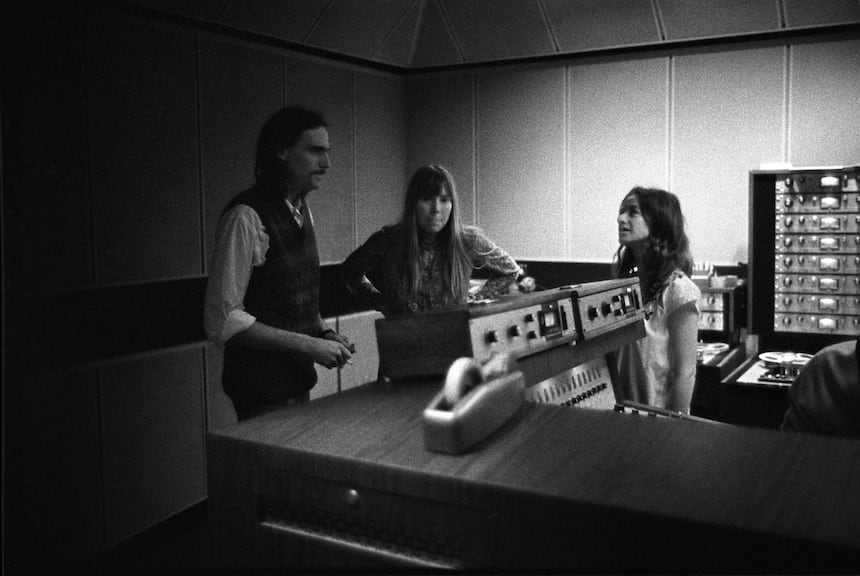Chronologically, Tapestry is not Carole King’s divorce record—that would be 1970′s under-appreciated Writer, released two years after her split from Gerry Goffin—but it is her liberation record.
Goffin and King had been the darlings of New York City’s music center in Midtown in the 1960s (commonly referred to as the Brill Building scene, though the two worked a block uptown at 1650 Broadway): writing such now-classics as "The Locomotion" (Little Eva), "Up on the Roof" (The Drifters), "One Fine Day" (The Chiffons), "(You Make Me Feel Like) A Natural Woman" (Aretha Franklin), "Will You Love Me Tomorrow" (The Shirelles) and many more. But after they broke up, King moved to Los Angeles' anything-goes Laurel Canyon neighborhood, ditched her good-girl pedal pushers for worn-in jeans, let her curls grow wild and began to claim her songs for herself.
Gerry Goffin and Carole King Songwriting in the 1960's
Carole KingBy the time Tapestry (produced by Lou Adler, a frequent collaborator of The Mamas and The Papas) came out in 1971, King had already remarried and would soon be pregnant with her third child. But the songs reflect the free-spiritedness of her new home and burgeoning feminism of the era (with one notable exception, but more on that later); it was the right record at the right time, going on to win four Grammys, sell more than 25 million copies worldwide, and cement King's new reputation as an emotion-fueled singer-songwriter alongside peers Joni Mitchell and James Taylor.
In fact, the three artists' friendship plays a huge part in the magic of Tapestry. King was working in Studio B of Hollywood's A&M Studios at the same time Mitchell was recording Blue in Studio C. Taylor was around town, too, recording Mud Slide Slim and the Blue Horizon. King has said it felt like they were all recording one continuous album, with Russ Kunkel playing drums on all three and guitarist/conga player Danny Kortchmar showing up on both Tapestry and Mud Slide Slim. King played piano on Taylor's album, Taylor played guitar on Mitchell's, and Taylor and Mitchell both sang backup for King—most strikingly on "Will You Love Me Tomorrow," which places their vocals in separate audio channels.

The bold, brash and bluesy "I Feel the Earth Move" was chosen as the first single. King has said she was reading Ernest Hemingway's For Whom the Bell Tolls during the writing session; the novel includes a scene where the characters make love in a forest and one feels "the earth move out and away from under them."
The San Fernando earthquake of '71 occurred days after the single was released, allegedly bringing it more airplay. But that wasn't enough to sway disc jockeys in the long run, as they favored the moody, minor-key B-side, "It's Too Late," with notable solo turns from both Kortchmar on guitar and sax player Curtis Amy.
Long connected to James Taylor, "It's Too Late" remains a bit of a tantalizing mystery. Popular myth thinks it refers to a romance between King and Taylor, who had toured together in early 1971 and were close friends. But the lyrics—"And it's too late, baby now, it's too late/ Though we really did try to make it/ Something inside has died, and I can't hide/ And I just can't fake it"—are by Toni Stern, who did date Taylor (before he moved on to Mitchell and then Carly Simon).
Taylor's influence also hovers over the heartbreaker "So Far Away," on which he plays acoustic guitar. It's about King missing her daughters and second husband, bassist Charlie Larkey (who is all over Tapestry), while she played piano on tour with Taylor, and she has said both this song and "You've Got a Friend" were inspired by Taylor's bittersweet sound.
Apparently, she nailed it: Taylor recorded "You've Got a Friend" for Mud Slide Slim, and it became a No. 1 single for him. Both artists' versions feature Mitchell on backing vocals and Kortchmar on acoustic guitar.
As previously noted, Taylor also joins Mitchell for backing vocals on "Will You Love Me Tomorrow," which had been King and Goffin's first No. 1 song when the Shirelles took it to the top of the Billboard charts of 1960 (also making it the first song by a black all-female group to reach No. 1 in the US).
Shirelles lead singer Shirley Owens reportedly didn't care for the song at first, deeming it "too country," but was swayed by the addition of strings. The song was allegedly banned by some radio station because of the content—a woman wondering how her relationship will change after sex. King's update slows the song down, making it sound less like a girl nervous about the future and more like a woman pondering the sexual revolution.
King bravely reinterpreted another of her and Goffin's biggest hits, "(You Make Me Feel Like) A Natural Woman," which became a signature hit for Aretha Franklin after she recorded it in 1967.
The story goes, King and Goffin penned the song (one of their last collaborations before their split) after a limousine pulled up as they were walking along Broadway and Atlantic Records partner Jerry Wexler stuck his head out the window and asked them to write a song titled "Natural Woman" for Franklin. For her own album, King reimagined the song as a slow burn, building to an emotional frenzy anchored by steady piano.
Also lending remarkable background vocals to Tapestry was Merry Clayton (famous for her haunting wail on the Rolling Stones' "Gimme Shelter"), on "Way Over Yonder" and "Smackwater Jack." The latter is an outlier on the album, in that it's not from a first-person POV. Nonetheless, the story song—about the conflict between Jack and Big Jim the Chief—became famous on its own as other artists covered it. Quincy Jones even made it the title song of his 1971 album.
King has said that "Beautiful" came to her in a fit of spontaneity while riding the subway—observing strangers and wondering how unhappy they are, while assuring herself that beauty is as much about how you see yourself as the way others perceive you. The self-esteem anthem became the title song of the Broadway show Beautiful: The Carole King Musical, which premiered in New York City in 2014 and ran for five years.
Meanwhile, another song from Tapestry bothered King for decades, so much so that she eventually reinvented it.
Not long after the album was released, King decided (perhaps helped by critics) that "Where You Lead," which she had co-written with Toni Stern, felt wrong in the age of feminism. In it, the narrator gives up her agency to her lover: "I always wanted a real home with flowers on the window sill/ But if you want to live in New York City, honey, you know I will."
As King later said: "After I recorded it for the Tapestry album, we women decided that we didn't actually need to follow our men anymore." For years, she wouldn't play the song live (although Barbra Streisand covered it, along with "Beautiful" and "You've Got a Friend," on her 1971 album Barbra Joan Streisand).
But when writer Amy Sherman-Palladino asked to use the song in 2000 for a new TV show she had created—Gilmore Girls— King revised it (again, with Stern’s help) and re-recorded “Where You Lead” with her daughter Louise Goffin. This time around, she sang it from the point of view of a mother talking to her daughter: “You never know how it’s all gonna turn out, but that’s okay / Just as long as we’re together, we can find a way.”

















